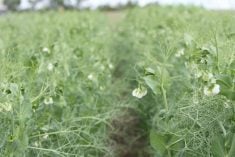Fed cattle prices up
Last week’s fed steer and heifer prices were $1.50-$2.00 per hundredweight higher than they were a week earlier.
Stronger U.S. trade helped set the pace for better prices in Western Canada, said Canfax. With a fair number of fed cattle moving south, local packers bid at or close to the U.S. floor price to keep cattle moving. That prompted last week’s price improvements.
Fewer fed cattle traded last week, compared to the week previous. Some cattle were passed at lower bids earlier in the week but most were trading by the close, Canfax said. Last Thursday’s trade saw steers at $85.75-$87.35 per cwt. and heifers $86 per cwt.
Read Also

Phosphate prices to remain high
Phosphate prices are expected to remain elevated, according to Mosaic’s president.
Domestic heifer slaughter from Jan. 1 to July 31, 2006, stood at 660,925 head, down from 798,963 last year.
Feeder cattle volumes were up by 19 percent last week when compared to a week earlier. Butcher cows and bulls took a nosedive, with D1,2 cows $3 per cwt. lower and butcher bulls $2.50 per cwt. lower, said Canfax. The agency said that was most likely due to larger runs and small kills.
Feeder prices were mixed last week. Light steers, 300-600 pounds, were down $1-$2.25 per cwt. Steers 600-800 lb. were steady to $2 per cwt. higher. Heavy steers were steady.
Light heifers, 300-500 lb., were steady to $1 per cwt. lower, Canfax reported. Heifers 500-700 lb. were $1-$4 per cwt. lower. Heavy heifers were steady.
Hog prices down
U.S. Midwest cash hog prices fell sharply last week, dropping $4 to $5 US per cwt. over the five-day period.
Many U.S. pork plants already had their slaughter needs filled for the week, meaning poor demand and lower prices.
Hog sales were steady early in the week with some producers attempting to sell ahead of the Labour Day long weekend. Cooler weather also prompted sales, resulting in ample supplies and keeping downward pressure on markets.
Plant closures for the Sept. 4 holiday also reduced packer demands.
Some producers delayed selling hogs late in the week, anticipating an improvement in prices after the holiday closures. The hog slaughter for the week finished heavier than expected, due partly to low cash prices and rising packer margins.
The Iowa-southern Minnesota live cash price for hogs delivered to plants fell to $51 per cwt. Sept. 1, down from $55 a week earlier.
The composite pork carcass cut-out value fell to $74.75 per cwt. on Aug. 31, down from $76.66 one week earlier.
Federal hog slaughter numbers in the U.S. were estimated at 399.4 million last week, up from 391.2 million the week before. To date, U.S. hog slaughter is 1.2 percent higher than the pace set last year.
Sheep and goats
Beaver Hill Auction in Tofield, Alta., reported 835 sheep and 99 goats sold on Aug. 28.
Good light lambs were fully steady to higher with finished lambs heavier than 120 lb. under pressure. Ewes and goats were steady for the quality on offer.
Lambs less than 70 lb. were $146-$161 Cdn per cwt., with sales to $184, 70-85 lb. were $136-$150 and 86-105 lb. were $118-$138.50.
Lambs heavier than 105 lb. were $100-$119.
Replacement ewes were $72-$91 per cwt. Cull ewes were $53-$72.
Rams were $60-$80 per cwt.
Good kid goats were $130-$192 per cwt. Nannies were $68-$120 and mature billies were $105-$132 per cwt.
Ontario Stockyards Inc. reported 1,593 sheep and lambs and 219 goats traded. All classes of sheep, lambs and goats sold steady.
Bison in trouble
There are growing indications that drought conditions in the U.S. plains states could hurt bison prices on both sides of the border this fall. Parched pastures and a lack of feed in major bison producing states such as South Dakota are expected to reduce the demand for Canadian feeder bison in the United States. There is also concern that drought conditions will result in increased culling on U.S. bison ranches, which has the potential to increase trim inventories.
Canadian rail carcass prices for top quality bison bulls younger than 30 months in the desirable weight range are unchanged at $1.70-$1.90 per lb.
The Aug. 16 USDA report said hot hanging weight bison bulls younger than 30 months are up slightly from last month at $180.19 US per cwt, an increase of 67 cents since the July report.














